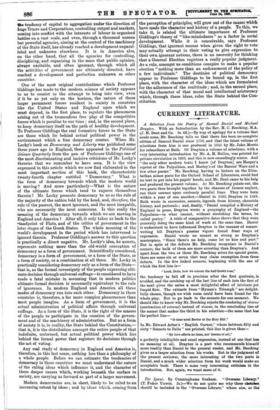CURRENT LITERATURE.
A Selection from the Poetry of Samuel Daniel and Michael Drayton. With an Introduction by the Rev. H. C. Beeching, M.A. (J. M. Dent and Co. 3s. 6d.)—By way of apology for a volume that needs none, Mr. Beeching tells us that there has been no complete edition of Samuel Daniel since 1718, and that the latest volume of selections from him is one produced in 1855 by Mr. John Morris for subscribers at Bath. Of Drayton a volume of selections, with a very interesting introduction by Mr. A. H. Bullen, was printed for private circulation in 1883, and this is now exceedingly scarce. And "the only other modern texts I know [of Drayton] are Hooper's reprint of the Polyolbion, and Morley's of the Barons' Wars and a few other poems." Mr. Beeching, having to lecture on the Eliza- bethan minor poets for the Oxford School of Literature, could find no text to put into his pupils' hands, and Mr. Dent came to his help and produced the present volume. As Mr. Beeching points out, the two poets thus brought together by the chances of former neglect, ran their courses upon curiously parallel lines. They were born within a year of one another,—Daniel in 1562, Drayton in 1563. Both wrote in succession, sonnets, legends from history, chronicle history, and pastorals ; and, finally, "Daniel compiled a History of England in prose, Drayton wrote a geography of England—the Polyolbion—in what cannot, without stretching the terms, be called poetry." A table of comparative dates shows that they were generally doing the same kind of work at the same time. Daniel is understood to have influenced Drayton in the manner of sonnet- writing till Drayton's greater vigour found freer ways of expression. Daniel wrote no sonnet as strong as Drayton's masterpiece, " Since there's no help, come let us kiss and part." But in spite of the defects Mr. Beeching recognises in Daniel's sonnets, the bulk of them are more arresting than Drayton's. And apart from the two or three Mr. Beeching seizes for special praise, there are some six or seven that may claim exemption from these defects. In the five linked sonnets, beginning with the one of which the first line is- " Look, Della, how we esteem the half-blown rose," the tendency to fall off in precision after the first quatrain, is avoided, and the catching up of the last line of each into the first of the next gives the series a most delightful effect of intricate yet limpid flow. The extracts from "Hymen's Triumph" are delight. fully chosen, though we wish room could have been found for the whole play. But to go back to the sonnets for one moment. We should like to know why Mr. Beeching rejects the rendering of ' :teem (contraction of esteems) instead of steams, in the concluding line of the sonnet that makes the third in his selection—the same that has the perfect line— "0 clear-eyed Rector of the Holy Hill."
In Mr. Edward Arber's " English Garner," where between fifty and sixty Sonnets to Delia " are printed, this line is given thus-
" My love affects no fame, nor '.teems of art," a perfectly intelligible and usual expression, instead of one that has no meaning at all. Drayton is a poet who recommends himself more readily than Daniel to the general reader, and Mr. Beeching gives us a larger selection from his works. But in the judgment of the present reviewer, the more interesting of the two poets is Daniel, and a much wider selection from his work would make an acceptable book. There is some very interesting criticism in the introduction. But, again, we want more of it.


















































 Previous page
Previous page